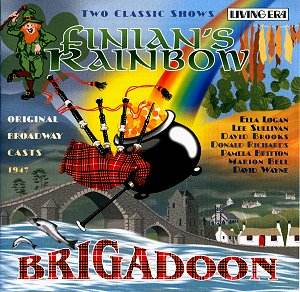 CD Reviews
CD Reviews MusicWeb
Webmaster: Len Mullenger
Len@musicweb.uk.net
[Jazz index][Purchase CDs][ Film MusicWeb][Classical MusicWeb][Gerard Hoffnung][MusicWeb Site Map]

Burton LANE (1912
–1997)
Finian’s Rainbow (1947) words
by Ed Harburg
Original Broadway cast: Ella Logan (sop) - Sharon;
Donald Richards (ten) - Woody Mahoney; David
Wayne, (bar) - Og; Albert Sharpe - Finian; Maude
Simmons (alto) - sharecropper; Albert Gilbert
(ten) - sharecropper
Lyn Murray Singers
46th Street Theatre orchestra/Max
Meth
rec. Columbia, 3 April 1947, New York, USA
Frederick LOEWE
(1901–1988)
Brigadoon (1947) words by Alan
Jay Lerner
Original Broadway cast: David Brooks (ten) -
Tommy Albright; Marion Bell (sop) - Fiona MacLaren;
Lee Sullivan (ten) - Charlie; Pamela Briton
- Meg; Delbert Anderson (bar) - Stuart; Hayes
Gordon (ten) - Sandy Dean; Earl Redding (ten)
- MacGregor
Ziegfeld Theatre orchestra/Franz Allers
rec. RCA Victor, 10, 23 March 1947, New York,
USA
![]() LIVING
ERA CD AJA 5530 [77.35]
LIVING
ERA CD AJA 5530 [77.35]
Crotchet Budget price
Both of these musicals contain songs that live on: Old Devil Moon (Finian’s Rainbow) and Almost like being in Love (Brigadoon). The productions themselves have not fared so well and revivals have been scarce. Of the two musicals, Finian’s Rainbow ran considerably longer than Brigadoon, yet the appeal of Burton’s music has not lasted. A film version came in 1968 with Fred Astaire, Petula Clark and Tommy Steele taking the leads. Now, fifty years on, I find that Brigadoon has a better score with stronger melodies and acceptable lyrics. We have to remember that despite both shows having good opening runs they were eclipsed by the earlier Annie get your Gun and the later Rodgers & Hammerstein successes of the forties and early fifties. Brigadoon was the Lerner-Loewe partnership’s first success and they went on to strike gold in the fifties with My Fair Lady whilst Lane faded into comparative obscurity.
Brigadoon was revived by Hyperion in an excellent 1990s digital recording under Ron Corp, but Finian’s Rainbow has not had such support. So how do these original production recordings now sound?
Burton’s scoring is particularly thin and to me lacks inspiration despite the obvious colour generated by a fanciful plot concerning a crock of gold stolen from Irish fairies; the naïve Finian believes the gold will accumulate if planted in the ground. Harburg’s lyrics are at times poorer than the worst of Bunn or Gilbert that came a hundred years earlier. In Something sort of grandish, ‘housish’ has to rhyme with ‘fish’ and later ‘please accept my proposish’ (for ‘proposition’). The Finian’s Rainbow recording has a rather broad-sounding American cast who sing with a strong twang, especially noticeable when Ella Logan sings words like ‘birds’ and ‘world’. Most noticeable are the accents heard within the chorus: they would make an ideal backing for Seven Brides for Seven Brothers. There is nothing wrong in this apart from the fact that it is a show dealing more with Irish fantasy and a leprechaun rather than happenings on the American prairie. Their leads, Ella Logan (soprano) and David Richards (tenor) are generally strong, David Richards being the better of the two with his velvety phrases and effortless long notes. Ella Logan comes across differently in some of her episodes: in the opening numbers she is good and her Irish accent sincere, but at times she reveals a slight huskiness (was she a smoker?) and in ‘Something sort of Grandish’ quite brittle and shrill. Maude Simmons contributes warmly in the contralto part of a sharecropper. David Wayne (tenor) is not so secure and wavers on some of his line endings.
By contrast, the Brigadoon score has better colour, though it’s not particularly Scottish. The plot, you may remember, concerns a mystical village that comes into existence for a day once every one hundred years. The singers thankfully do not Americanize the Scottish lyrics and the performance is generally superior to that heard in Finian’s Rainbow. The opening seems to be taken too fast to be initially appealing, but this settles down to a better pace. Delbert Anderson leads the chorus with a powerful presence. Marion Bell and David Brooks are equally strong leads, pleasantly-toned and this time with clear anglicised diction to enhance their hit songs, The Heather on the Hill and Almost like being in Love. This CD contains two bonus tracks with 1946-47 chart hits. How are things in Glocca Morra with Dick Haymes and Almost like being in Love with Frank Sinatra.
The audio restoration by Martin Haskell is particularly good with no track noise and excellent equalization. The orchestras are typical pit bands with single wind and brass, and modest though adequate strength in the strings. The Brigadoon orchestra seems to have been enhanced in the strings section to good effect.
Raymond Walker